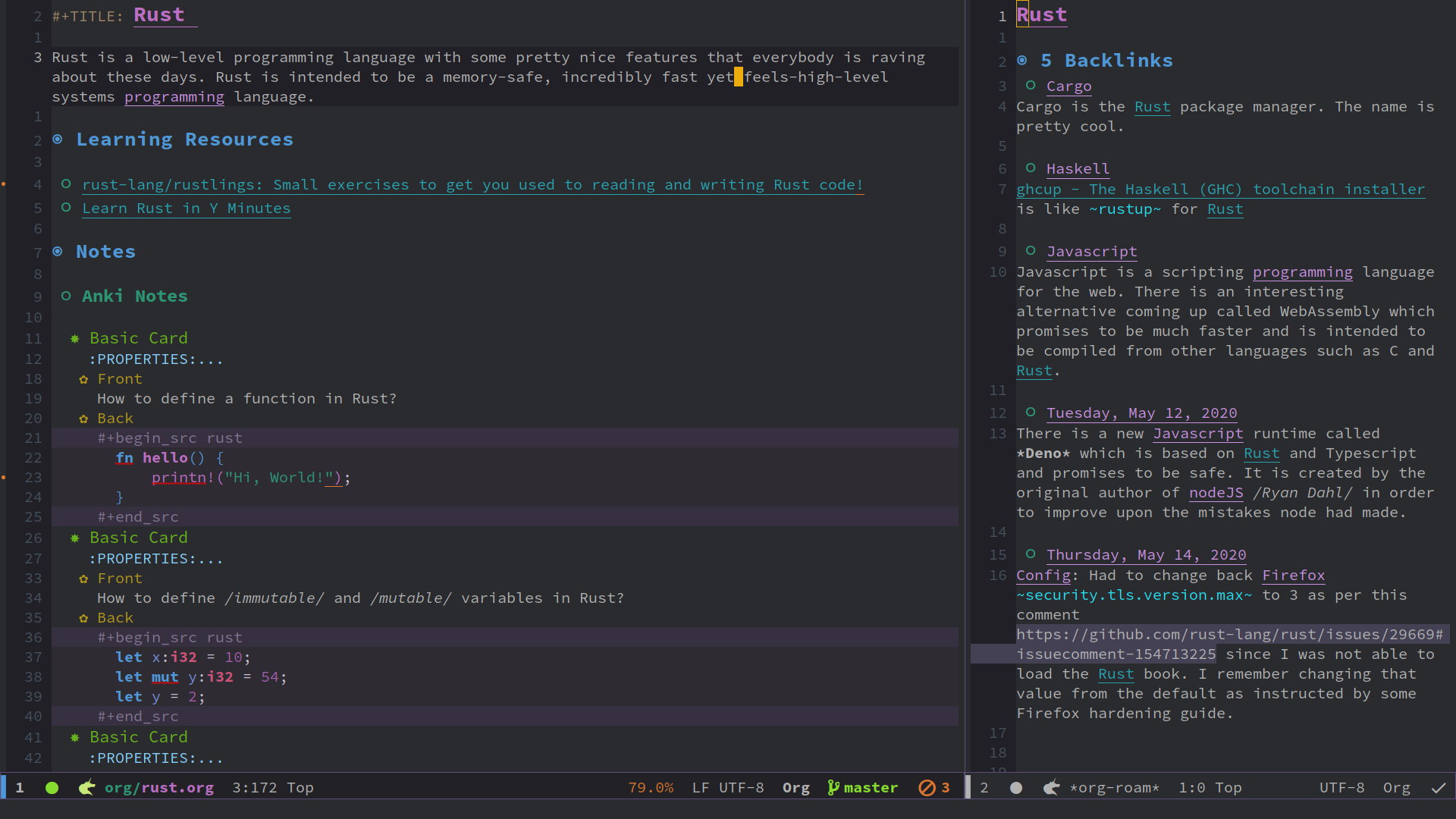org-roam (Emacs Zettelkasten Package) Version 2 Released
 org-roam (Emacs Zettelkasten Package) Version 2 Released
org-roam (Emacs Zettelkasten Package) Version 2 Released
A Zettelkasten is a personal tool for thinking and writing that creates an interconnected web of thought. Its emphasis is on connection and not mere collection of ideas.
Howdy, Stranger!
Comments
@ctietze or @Sascha
This looks really complicated to someone who is not at all familiar with all the terminology and systems. Is there some reason why I would want to look at it further?
the one thing that stands out the most for me are the special character used for bullet points. I assume that this is some customization. Isn't that problematic if you would like to use
.orgfiles with other tools?I think that the syntax is more verbose than it needed to be, i don't like the prefixes on title and code blocks. OTOH i like the syntax for links a lot. I didn't understand how they work. Are link targets embedded in the text file or exclusively stored in database? There is one time in the video where it shows a syntax similar to Markdown references.
my first Zettel uid: 202008120915
@zk_1000 The "pretty" bullets are just an on-the-fly replacement of item markers, (e.g.
*or**, similar to how Markdown headings work) with fancy unicode characters for rendering; it's still asterisks all the way down. The rendering is done by packages like: https://github.com/sabof/org-bullets(Others use actual SVG vector graphics or other icons as stand-ins.)
Can you clarify what puzzles you about links?
In the text document, it boils down to
[[url/to/link/target][Readable text for humans]], and in the rendering step the brackets and the URL or target part are hidden and only "Readable text for humans" is being shown.The link target IDs are automatically generated metadata attached to outline items (aka headings). So somewhere in the document, there'll be a part like
... or some such. Again, the editor settings usually make it so that the properties metadata list is usually hidden. In the screenshot above you see that as
:PROPERTIES:..., and one could expand the block by hitting the tab key on that line.I agree that esp. code blocks add a bit too much noise. I've seen demos of folks who basically hide the
#begin_src language ...line completely. That makes editing the source block markup harder, of courseAuthor at Zettelkasten.de • https://christiantietze.de/
thank you for the explanation that was helpful. Looking at my own notes i find that the plain text is what makes it more enjoyable for me to work with my Zettelkasten. My UID is a running counter and every time i create a new note i can see how many notes i already created, it is a bit addictive. The downside is that this makes me rely much more on an appealing syntax, which does affect my note taking as well.
This is not an issue if you can hide elements from the view. I am surprised to what extend the rendering has been modified. A little bit too much for my taste but i can definitely see its advantages.
my first Zettel uid: 202008120915
Thank you for alerting the forum to org-roam v2 @System - very cool. It's an amazing module.
tl;dr - In my experience, the only way to appreciate the power of org-roam is to dive in and learn how to use it.
In fact, I proved my point to myself as I spent a half hour writing in this post saying here's a list of [insert cool thing here] you can do in org-mode/org-roam. I just deleted the text. At least for me, it's not realistic to communicate the power/experience of org-roam (and other modules like org-roam-server and org-transclusion), to say nothing of org-mode, let alone emacs, from the outside in.
There is a learning curve to emacs that never ends and in my relatively limited experience (2 years) it's a feature not a bug. It's radically transformed the way I interact with, relate to, and experience my computer. I'm much less of a reactive consumer. My computer is a tool I can make do things for me. I've found it very empowering.
There are also a TON of kind and generous people willing to help if a person is willing to read documentation, learn to ask well-formulated questions, and put in the work to figure stuff out on their own.
Quick final note, in my opinion/experience, The Archive is excellent software that well serves the needs of many zettelkasten users. I still use it.
That said, org-roam is its own class because it fully integrates with org-mode and because... emacs. Fortunately, life is not a zero sum game.